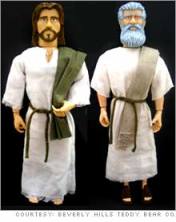
Did the Jewish philosopher Philo influence the story-line and character-portrayals that we read in the Gospel of Mark? I cannot yet commit myself to believing he did but I am keen to follow up the question since encountering it in Reimagining Christian Origins: A Colloquium Honoring Burton L. Mack. (Mack, of course, is famous for his works on Christian origins and particularly on the Gospel of Mark.) Specifically it was in chapter 11, “The Son of Timaeus: Blindness, Sight, Ascent, Vision in Mark” by Earle Hilgert. He writes on page 187:
Particularly in the thought of Philo of Alexandria (c. 20 B.C.E. to c. 50 C.E.) the myth of ascent vision combines with the epic figures of Israel’s history, who are seen as models of this experience. As models, they are to be imitated; thus their stories become stories of the psyche, paradigms of the possibilities available to the individual. Mack has pointed out a striking formal parallel between Philo’s De Vita Mosis and the Gospel of Mark.
The work by Mack cited here is “Imitatio Mosis: Patterns of Cosmology and Soteriology in the Hellenistic Synagogue,” Studia Philonica, 1 (1972): 34. Since I do not have access to this article I decided to refresh my memory of Philo’s Life of Moses and compare with the Gospel of Mark myself. But Earle Hilgert does give us a head start when he lists the main points of apparent contact between the two works according to Mack:
| Life of Moses 1 | Gospel of Mark |
|---|---|
| The call-vision of Moses at the burning bush (1.65-70) | The call vision of Jesus at his baptism |
| The secret announcement to the elders of Israel of an impending departure to a better land (1.86) | Jesus’ announcement of the kingdom |
| The legitimization of Moses’ authority through miracles (1.91-139) | Jesus’ miracles |
| Moses’ ascent and admission to the presence of God on Sinai — a model for all who are willing to copy (1.158) | Jesus’ transfiguration |
| The journey through wilderness with its trials (1.164, 171, 183) | The journey to Jerusalem |
| Moses’ ascent to heaven at his death (2.288-91) melded with his ascent to the divine presence at Sinai | Jesus’ paradigmatic death |
That’s Burton Mack and Earle Hilgert. My own reflections follow. The purpose of the following is not to argue dogmatically a particular point. It is to invite anyone interested into a consideration of another way of thinking about an old question, and that need not be limited to a direct cause and effect option.
Continue reading “Is the Gospel of Mark Creatively Emulating Philo’s Life of Moses?”
